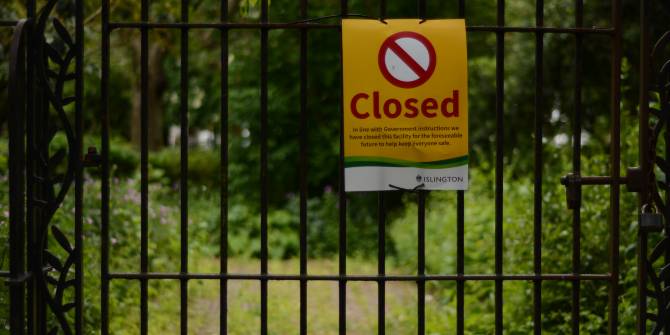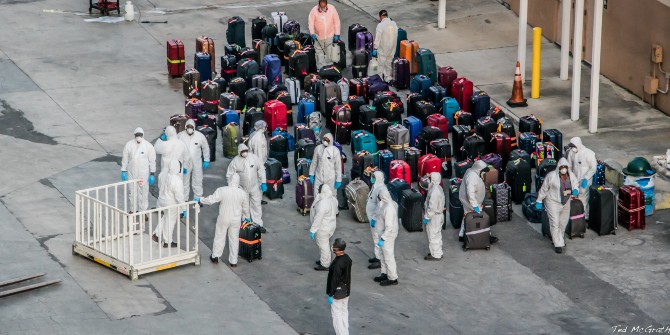People have largely conformed to lockdown because of a sense of collective responsibility rather than out of the fear of punishment. As the restrictions loosen, Corsino San Miguel (University of Glasgow) says it will become increasingly important to distinguish between law and guidance. Trust in ‘British common sense’ is not enough.
The new social order and the promotion of a sense of collectivism
COVID-19 has reshaped our social order. Fundamental patterns in social behaviour have been altered by the government’s response to the epidemic. New legislation has given public bodies the tools and emergency powers they need to react effectively to the epidemic. Accompanying these new laws, new guidance for public sector employees from surgeons to train drivers has bolstered the effort to ensure all citizens conform to the socially-distanced “new normal”.

There is a clear relationship between compliance with these new measures and success in fighting the epidemic. How to ensure that people follow the measures, however, has emerged as a key issue – whether through consensus, by putting the onus on the public’s common sense, or through coercion with the threat of fines and penalties. Behavioural scientists involved in the SAGE meetings from the outset speculatively identified a national sense of collectivism as crucial to achieving compliance, while avoiding widespread public disorder.
Recent empirical evidence published on LSE British Politics & Policy proves this initial speculation to be correct. Compliance with the new social order is rooted in a shared identity and “a widespread sense of duty and solidarity”, rather than coercion. Dr Anthony Fauci, a high profile American public health expert, recently asserted that the only way we ‘are going to end it is ending it together”. In an apparent echo of Fauci’s comments, empirical data shows that in the UK at least, citizens are complying with the guidance and new regulations by consent more than compulsion.
The effect of the criminalisation of conduct
What effect has the criminalisation of breaches of government guidance had on how the public have complied with this new social order? Again, empirical data has shown that people have generally followed the guidance more as a result of the expressive function of the law rather than because of a threat of punishment. In restricting gatherings and adopting social distance as a legal requirement, lawmakers have primarily sent a clear message to citizens about what they perceived to be the right way to combat the epidemic. And more importantly, these new legal norms have combined to present a behavioural code that clarifies how the government expects us to behave and how we, in turn, should expect others to behave towards us.
Quantitative research has also undermined a widely supported academic argument that coercive rule-enforcement promotes cooperation with legal rules. In the Dominic Cummings saga, for example, empirical evidence shows that those irritated with Cummings’s behaviour were more likely to comply with guidelines anyway, turning Cummings into a convenient villain of the piece or, as Stephen Reicher puts it, “a useful anti-role model”. The clear conclusion of these findings is that sanctioning defectors does not have a critical impact on how likely citizens are to obey the law.
Criminal law therefore has an important role in maintaining and sustaining social order. But lawmakers and legal scholars have a lesson to learn as well, namely that the contribution of criminal norms to the protection of social order should not be grounded solely on coercion but in the expressive function of the law as well.
Social order is about trust
Defining a range of offences and defences, substantive criminal law declares what conduct is permitted or prohibited. Legal norms prescribe conduct and shape expectations about what others should or should not do. We can therefore make decisions based on how we anticipate others will behave. Simultaneously, the behaviour of others will rest on assumptions about how we will act, making them also vulnerable to us. This mutual vulnerability can only be overcome by trust.
Legal rules prescribe behaviour and hold society together by promoting mutual trust. Each of us goes about our business with the expectation that everybody will comply with the law. For instance, we walk across a zebra crossing when a car is coming because, as a pedestrian, we share the same understanding of traffic regulations as the driver. Such regulations make the unknown driver trustworthy to us. We don’t cross because sanctions are in place to punish law-breaking drivers, but because we expect the driver to follow the rules rooted in our dependency on each other. In short, the expressive function of criminal law promotes trust between strangers and thereby contributes to the maintenance of social order.
Public health is also about trust
Combatting a global epidemic requires large-scale cooperation. This cooperation, in turn, relies on people bearing an individual cost to benefit others, and therefore assumes an element of altruism in people’s behaviour. For that reason, authorities need to persuade people that compliance with the new social order is essential to the containment of the epidemic beyond any individual gain. This is a massive task due to the demographic diversity of the UK population. Rules and regulations alone are insufficient to police this commitment; institutional and interpersonal trust are also crucial components in an effective response to the global pandemic.
The West Africa Ebola outbreak in 2015 proved that trust in institutions and governments is an important determinant of citizens’ compliance with public health policies or fostering vaccination. Fast forward to 2020, and a lot has been written about how the Cummings saga has undermined trust in the UK government. The emergent sense of community so critical to the success of the government’s response to the outbreak has been directly assaulted by Johnson’s defence of Cummings’ moral reason or “parental instinct”. Public trust and public health are, after all, two sides of the same coin.
Others count on us to follow the rules just as we count on them
Interpersonal trust is equally important in public health, because people are more likely to cooperate when others are also cooperating. Game theory proves the detriment to the common good of the group when players act out of self-interest and choose the best option for them alone. The high levels of compliance with regulations during the COVID-19 and other pandemics are undoubtedly linked to the expectation that others will also comply with these regulations.
Enhance the expressive function of the law to avoid confusion and increase compliance
As the authorities begin the process of incrementally easing the lockdown, new regulations and guidance are issued and amended at short notice. Since March, a flurry of regulations and guidance issued by the UK government has criminalised overnight stays away from home and gatherings of groups of more than six people, and introduced mandatory face coverings on public transport and a fortnight of self-isolation for those entering the country. In Leicester, after the local lockdown has been extended, new measures have closed schools and non-essential shops.
Unsurprisingly, many people have been unsure about what was prohibited, permitted or advised at different times. A minority, taking advantage of the confusion, followed their own instinct and, in so doing, potentially sabotaged the common good.
This may well become an increasingly common trend in the coming weeks, if a clear line is not drawn between law and guidance. Clear communication from policymakers differentiating between prohibited conduct, reasonable exceptions and recommended guidance will be crucial to the effort of achieving national compliance. In order to bring the whole country together to combat the coronavirus, trust in ‘good solid British common sense’ alone will not suffice. Enhancing the expressive function of the law will also be critical in underpinning a sense of public trust and cooperation. Paradoxically, when the expressive function of the law is not clearly and comprehensively spelled out, the risk of having to resort to coercion by authorities increases.
This post represents the views of the author and not those of the COVID-19 blog, nor LSE.






This really doesn’t answer the question of what is guidance and what is law.
For example, my local council has signs in many places stating “You must keep 2m apart” this implies it is a law, but it is not, it is guidance.
Very interesting and helpful article – thank you for publishing.
Agree with Alan. Unfortunately this article doesn’t provide any guidance for local authorities on who is eligible for Uk Government COVID business support grants. The basic premise of the UK Government initiative was to provide support to businesses severely impacted by the restrictions when most needed and as soon as possible. NOT allow local authorities to discriminate against one section of the Accommodation Industry and exclude their applications because they are non-rated self catering as opposed to being a hotel or BnB providing in person services. The Uk Government provided a subsequent update to the Guidance for Local Authorities on 16 June 2021 with no specific reference to any section being excluded but still local authorities ignore these very specific guidance to help those business severely impacted by the restrictions.